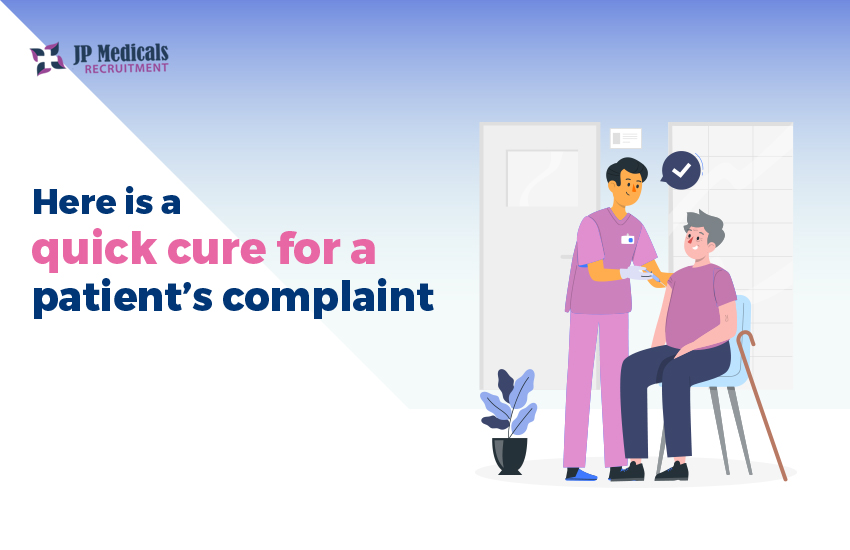Patient’s complaint can be dreadful. But not anymore. In today’s times when the patient safety culture is emphasized more, they can be the real opportunities to improve your healthcare service. If you are a nurse, what’s essential is effective nursing leadership for better outcomes.
But if you have had a bad experience handling patients, then this blog can help you. We have a quick cure on how to handle a patient’s complaints. Continue to stay here.
Between the years 2017-2018 NHS England alone had 208,626 written complaints, with an average of 4,012 complaints a week or 572 a day. This just means that almost every doctor during the course of their career is expected to receive a complaint(s) now and then.
What is a complaint and who makes it?
An indication or articulation of dissatisfaction demanding a response to the service offered is a complaint. It is usually raised to the practice manager or the staff and it is crucial that all healthcare staff knows how to recognize and handle one.
According to the NHS, a person who is either directly impacted by an NHS organization or someone on his behalf can make a complaint.
What are the common reasons for someone to complain?
It could be due to an oversight in treatment, neglect to meet the patient’s expectations, or other complications with regards to treatment or service, etc. Sometimes it could be due to the lack of human empathy, courtesy, indifference, or aggression by the healthcare staff or due to issues with patient hospitalizations and patient mortality.
A slow and meticulous way of managing patient expectations about treatment can help alleviate the risk level of complaints during an unwanted trigger. What you would need then is a knack to handle it with diplomacy, and your expression that it will not negatively affect the patients’ satisfaction.
The goal of handling your patient’s complaint procedure is to resolve it amicably to the fulfillment of all the parties involved.
Here are tips that will help you handle even the most difficult patients without losing your temper.
Listen to the complaint
The angrier a person gets, he can end up damaging your facility’s service more. Your first task is to assist in the patient care needs, hence listening to the patient’s complaint is vital. Listen attentively to what they have to say first, for this is part of the patient care process.
Treat them with respect
If the patient behaves in inappropriate behavior, remind the patient by saying softly that you deserve to be treated as you are treating them with respect. If things go out of control, try stepping out of the situation, and waiting for the patient to calm down. If you are unable to handle things alone, get the help of your co-worker whom you think is good at easing the situation.
Try getting a factual account relating to the complaint
This could help you most of the time. Try pulling out a solid substantial understanding of the care connecting to the complaint. Sometimes there could be misconceptions about the whole happening or the sequence of events, therefore drafting out a clear or when certain events occurred, so setting out a clear draft with proof can be helpful.
Calm down and empathise with the patient
A pacifying conversation that better expresses empathy and sympathy can be very encouraging. It ensures patient empowerment. There can be nothing better than this. A simple way of conversing that you understand why the person is upset can diffuse the whole situation into nothing.
An explanation is all that’s needed
You don’t need a script drafted out to explain your stance. All that you need in plain language is an explanation so the patient really understands what happened, why it happened, and how it can be fixed.
Never miss out to give responses
If you received a letter of complaint from the patient, do not fail to offer responses to each of the concerns described in it by clearly explaining your opinion about the issue and how you have reached it.
An apology can ease up things
No matter you have no limits to control over the events, apologise directly for the issue that happened. Just remember, an apology doesn’t mean an admission of weakness, but can sometimes be a key to settling things and satisfying a complainant.
Discuss with your risk management team
If it is got to do with your wrong treatment, then discuss with your risk management for leadership interventions before speaking to a patient. Because in all complaints associated with the NHS treatment, the complainant is always informed to check from the appropriate national ombudsman.
To conclude, receiving complaints could be disheartening but following adequate procedures by responding with empathy can assist in resolving complaints reasonably well. A leading NHS agency nurse recruiter, contact us if you need our service related to nursing recruitment.





